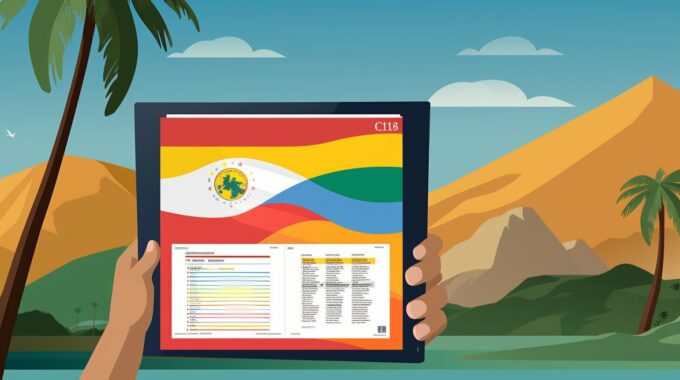At the forefront of property financing in Costa Rica, GapInvestments.com stands as a beacon for…

Complete Guide on Reporting Income for Costa Rica Residency
Reporting income for Costa Rica residency involves filing the “Declaración de Impuesto sobre la Renta” or Income Tax Return, which is necessary for individuals seeking residency in the country. Whether you are a US citizen or an expat, understanding the requirements and tax obligations for reporting income in Costa Rica is essential for a successful transition.
- US citizens living in Costa Rica must file both US and Costa Rican tax returns.
- Income from Costa Rican sources is taxable, while income from non-Costa Rican sources is not.
- Tax rates in Costa Rica vary based on the type and level of income.
- Residents are taxed at progressive rates ranging from 0% to 25%.
- Non-residents’ income is taxed at flat rates of 10%, 15%, or 25%.
It is important to note that the tax year in Costa Rica runs from October 1 to September 30, and tax returns must be filed by February 15. Additionally, individuals may encounter other taxes such as property tax, property transfer tax, value-added tax, and corporate tax while living in Costa Rica.
Consulting with qualified tax professionals who are familiar with the tax laws of both the US and Costa Rica is advisable to ensure compliance and maximize tax benefits. Although there is currently no US-Costa Rica tax treaty or totalization agreement, understanding and fulfilling your tax obligations will help you navigate the process of reporting income for residency in Costa Rica smoothly.
Requirements and Tax Obligations for Costa Rica Residency
To fulfill the reporting requirements for Costa Rica residency, individuals must meet the residency requirements and comply with the tax obligations set by the Costa Rican government. US citizens living in Costa Rica are also required to file US tax returns along with their Costa Rican tax returns.
For Americans in Costa Rica, the process of reporting income for residency involves filing the “Declaración de Impuesto sobre la Renta” or Income Tax Return. It is important to note that Americans are only taxed on income from Costa Rican sources, not on income earned outside of Costa Rica.
Typically, taxes on employment income are withheld by the employer, eliminating the need for a tax return. However, individuals who earn income from non-traditional sources such as self-employment, rental income, fees, commissions, royalties, or interest may need to file a tax return.
The income tax rate in Costa Rica varies depending on the type of income and income level. Dividend and interest income generally incur a tax rate of 15%, while most capital gains are exempt from taxation. Residents of Costa Rica are subject to progressive tax rates ranging from 0% to 25% for salaries and self-employment income. Non-residents, on the other hand, are taxed at a flat rate of 10%, 15%, or 25%, depending on the type of income earned.
To qualify as a resident for tax purposes, individuals must spend more than 183 days in Costa Rica within a given tax year. It is important to note that the tax year in Costa Rica runs from October 1 to September 30, and tax returns are due by February 15. Additionally, Americans living in Costa Rica may also encounter other taxes such as property tax, property transfer tax, value-added tax, and corporate tax. Consulting with qualified tax professionals is strongly advised to navigate both US and Costa Rican tax laws, as there is currently no US-Costa Rica tax treaty or totalization agreement in place.
FAQ
Q: Do Americans living in Costa Rica need to file tax returns?
A: Yes, US citizens living in Costa Rica are required to file both US tax returns and Costa Rican tax returns.
Q: What income is subject to taxation in Costa Rica?
A: Individuals in Costa Rica are only taxed on income from Costa Rican sources, not on income from non-Costa Rican sources.
Q: When is a tax return necessary for individuals in Costa Rica?
A: A tax return may be necessary if individuals earn income from sources other than traditional employment, such as self-employment income, rental income, fees, commissions, royalties, or interest.
Q: What is the income tax rate in Costa Rica?
A: The income tax rate in Costa Rica varies based on the type of income and income level. Dividend and interest income are generally taxed at 15%, while most capital gains are exempt from taxation. Residents of Costa Rica are taxed at progressive rates ranging from 0% to 25% for salaries and self-employment income. Non-residents’ salaries or self-employment income are taxed at a flat rate of 10%, 15%, or 25% depending on the income type.
Q: How is residency determined for tax purposes in Costa Rica?
A: Individuals who spend more than 183 days in Costa Rica within a given tax year are considered residents for tax purposes.
Q: What is the tax year in Costa Rica and when are tax returns due?
A: The tax year in Costa Rica runs from October 1 to September 30, and tax returns are due by February 15.
Q: Are there any additional taxes that Americans living in Costa Rica may encounter?
A: Yes, additional taxes that Americans living in Costa Rica may encounter include property tax, property transfer tax, value-added tax, and corporate tax.
Q: Is there a tax treaty or totalization agreement between the US and Costa Rica?
A: There is currently no US-Costa Rica tax treaty or totalization agreement.


